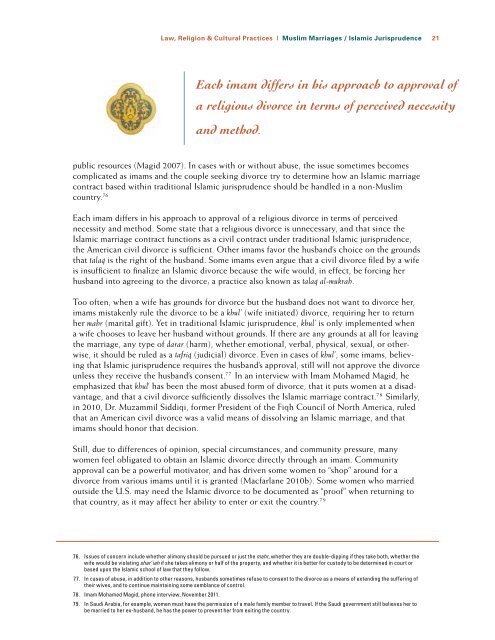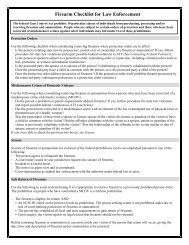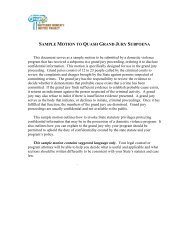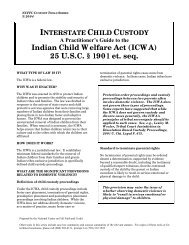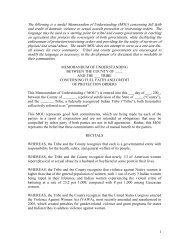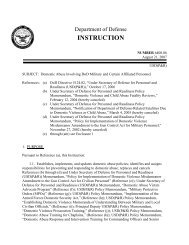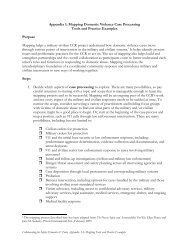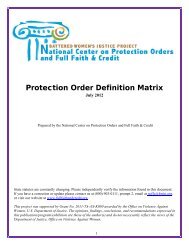ISLAMIC MARRIAGE CONTRACTS - Peaceful Families Project
ISLAMIC MARRIAGE CONTRACTS - Peaceful Families Project
ISLAMIC MARRIAGE CONTRACTS - Peaceful Families Project
Create successful ePaper yourself
Turn your PDF publications into a flip-book with our unique Google optimized e-Paper software.
Law, Religion & Cultural Practices | Muslim Marriages / Islamic Jurisprudence<br />
21<br />
Each imam differs in his approach to approval of<br />
a religious divorce in terms of perceived necessity<br />
and method.<br />
public resources (Magid 2007). In cases with or without abuse, the issue sometimes becomes<br />
complicated as imams and the couple seeking divorce try to determine how an Islamic marriage<br />
contract based within traditional Islamic jurisprudence should be handled in a non-Muslim<br />
country. 76<br />
Each imam differs in his approach to approval of a religious divorce in terms of perceived<br />
necessity and method. Some state that a religious divorce is unnecessary, and that since the<br />
Islamic marriage contract functions as a civil contract under traditional Islamic jurisprudence,<br />
the American civil divorce is sufficient. Other imams favor the husband’s choice on the grounds<br />
that talaq is the right of the husband. Some imams even argue that a civil divorce filed by a wife<br />
is insufficient to finalize an Islamic divorce because the wife would, in effect, be forcing her<br />
husband into agreeing to the divorce; a practice also known as talaq al-mukrah.<br />
Too often, when a wife has grounds for divorce but the husband does not want to divorce her,<br />
imams mistakenly rule the divorce to be a khul’ (wife initiated) divorce, requiring her to return<br />
her mahr (marital gift). Yet in traditional Islamic jurisprudence, khul’ is only implemented when<br />
a wife chooses to leave her husband without grounds. If there are any grounds at all for leaving<br />
the marriage, any type of darar (harm), whether emotional, verbal, physical, sexual, or otherwise,<br />
it should be ruled as a tafriq (judicial) divorce. Even in cases of khul’, some imams, believing<br />
that Islamic jurisprudence requires the husband’s approval, still will not approve the divorce<br />
unless they receive the husband’s consent. 77 In an interview with Imam Mohamed Magid, he<br />
emphasized that khul’ has been the most abused form of divorce, that it puts women at a disadvantage,<br />
and that a civil divorce sufficiently dissolves the Islamic marriage contract. 78 Similarly,<br />
in 2010, Dr. Muzammil Siddiqi, former President of the Fiqh Council of North America, ruled<br />
that an American civil divorce was a valid means of dissolving an Islamic marriage, and that<br />
imams should honor that decision.<br />
Still, due to differences of opinion, special circumstances, and community pressure, many<br />
women feel obligated to obtain an Islamic divorce directly through an imam. Community<br />
approval can be a powerful motivator, and has driven some women to “shop” around for a<br />
divorce from various imams until it is granted (Macfarlane 2010b). Some women who married<br />
outside the U.S. may need the Islamic divorce to be documented as “proof” when returning to<br />
that country, as it may affect her ability to enter or exit the country. 79<br />
76. Issues of concern include whether alimony should be pursued or just the mahr, whether they are double-dipping if they take both, whether the<br />
wife would be violating shar’iah if she takes alimony or half of the property, and whether it is better for custody to be determined in court or<br />
based upon the Islamic school of law that they follow.<br />
77. In cases of abuse, in addition to other reasons, husbands sometimes refuse to consent to the divorce as a means of extending the suffering of<br />
their wives, and to continue maintaining some semblance of control.<br />
78. Imam Mohamed Magid, phone interview, November 2011.<br />
79. In Saudi Arabia, for example, women must have the permission of a male family member to travel. If the Saudi government still believes her to<br />
be married to her ex-husband, he has the power to prevent her from exiting the country.


